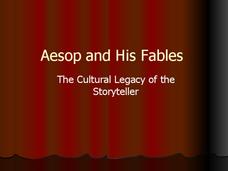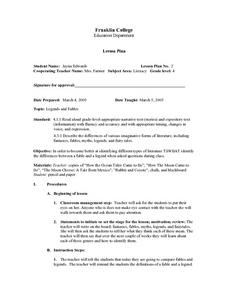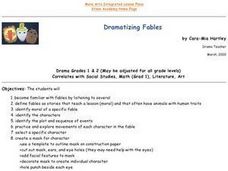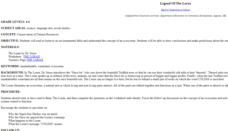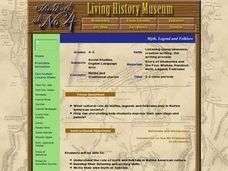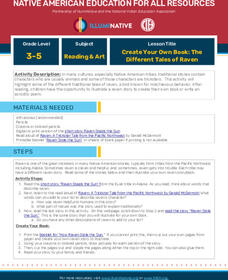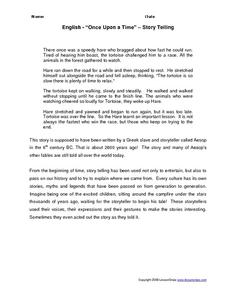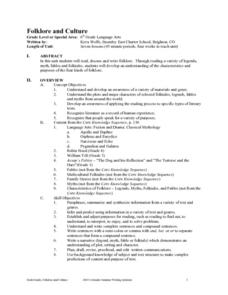Curated OER
Introduction to Myths, Fables, and Legends
Middle schoolers identify elements of myths, fables, and legends as they read an example of each. After reading an example of each type of story, they list elements from each. They compare and contrast these features by completing a...
Curated OER
Legends
Students are introduced to the topic of legends. Using the text of Irving's novels, they gather information on different cultures. They practice using new vocabulary and their listening skills. They retell the stories in chronlogical order.
Active 770
Aesop and His Fables
Most people have heard of Aesop's Fables, but who was Aesop and when did the fables actually get recorded? Teach your class all about Aesop and fables in general with the presentation before inviting them to examine several fables and...
Curated OER
Fantasy, Fables, Myths, Legends & Fairy Tales
Students identify the differences between fantasies, fables, myths, legends and fairy tales. In groups, they create their own versions of the different genres. They practice identifying the examples, as well.
Curated OER
Legends and Fables
Fourth graders identify and discuss the differences between legends and fables. They define fable and legend, then as a class take turns reading our books. Students select two of the stories, and complete a Venn diagram, comparing one...
Curated OER
What Makes a Fable?
Third graders explore fables. In this fables lesson, 3rd graders use Venn Diagrams to organize information about 2 fables they will read. Students work in groups to fill out the diagrams and share their results with the class. Students...
Curated OER
Is That a Fact? A Comment on Modern Fables
Students complete literary analysis for modern fables or urban legends. In this modern fables lesson, students listen to an urban legend and discuss it. Students then research urban legends online and write their own urban legend.
Curated OER
Myths, Legends, and Fables
In this social studies worksheet, students find the words that are related to the legends of mythology and the answers are found at the bottom of the page.
Curated OER
Elements of the Oral Tradition
Various genres of oral tradition are outlined and defined in these slides. Give your class examples of folk tales, fairy tales, parables, fables, legends, and myths before reading an example of one of these stories. This overview acts as...
Curated OER
Mayan Myths/Folktales
Middle schoolers work on summarizing a story, and they determine if it is a legend, a myth, or a fable. Working in groups to read and summarize stories, they then list evidence whether the tale is a myth, fable, or legend. They present...
Curated OER
Fairy Tales and Folklore Tell about....
Every elementary age child learns about the different genres of literature, this PowerPoint will give them a clear idea of what to look for when identifying Folklore and Fairy Tales. Each slide describe the characteristics of Folklore,...
Curated OER
Dramatizing Fables
Students familiarize themselves with fables by listening to several of them. They define fables. They identify the moral of a specific fable. They identify characters, plot and sequence of events. They create a mask of a character in a...
Curated OER
"Theseus and the Minotaur"
Students analyze the features of myths and legends. They read the myths "Theseus and the Minotaur" and "Orpheus and Eurydice," identify the myth story elements, evaluate each story for the overall theme, describe the characters, and...
Curated OER
Legend of The Lorax
Young scholars explore ecosystems. They read or listen to Dr. Seuss' The Lorax to draw conclusions and make predictions about the environmental impact and use of resources. They write poems about real forests and the wildlife which...
Curated OER
Storytelling
Students explore the origins of folktales, fairytales, myths, legends, fables, and folktales in the ten lessons of this unit. A storytelling festival is held to feature the results of the variety of activities presented in the unit.
Curated OER
Slow and Steady Wins the Race
Students are introduced to the characteristics of fables. They read a fable by Aesop. In small groups, students identify fable characteristics present in Aesop's story and share their observations with the class.
Curated OER
Storytelling In America
Students discuss how Washington Irving is considered an important 19th century-American storyteller. They create their own version of a passage from 'The Legend' after listening to the story.
Curated OER
Myth, Legend and Folklore
Students examine the role of myths and folklore in the Native American culture. They listen to examples of oral history and write their own. They share their story with the class.
Curated OER
Create Your Own Book: The Different Tales of Raven
The raven is the focus of a lesson that examines trickster tales and the different stories about the bird. After listening to three tales about the raven, scholars pinpoint and discuss descriptive words. Pupils use one story to...
Curated OER
Teaching Language Arts in Kindergarten Using Stories, Aesop's Fables, and Tall Tales
Students search into a variety of story elements in the eight lessons of this unit. The title, author, illustrator, setting, main character, problem, solution, events and the story are the components of the lessons.
Curated OER
Using Graphic Organizers to Generate Genre Definitions
Students listen to or read a variety of stories and then work individually or in groups to complete graphic organizers that will help them focus on elements within different types of stories. They write definitions for a variety of story...
Curated OER
English - "Once Upon a Time" - Storytelling
In this storytelling learning exercise, 4th graders fill in 17 missing words without looking at the story. After the students read the story again aloud in pairs, the students complete a matrix on how well each student reads the story...
Curated OER
Folklore and Culture
Sixth graders explore the four kinds of folklore in this seven lesson unit. Through reading a variety of legends, muths, fables, and folklores the concepts pf the lessons are synthesized byStudents.
Curated OER
The Spanish Belief in Justice and Values
Fifth graders study "justice" and "values" as illustrated through fables. The determine that some of the fables in the U.S. are relatively similar to those fables in other parts of the world. They write and illustrate their own fables.
Other popular searches
- Legends Myths Fables
- Comparing Legends and Fables
- Myths, Legends and Fables
- Writing Fables and Legends
- Myths Legends and Fables




